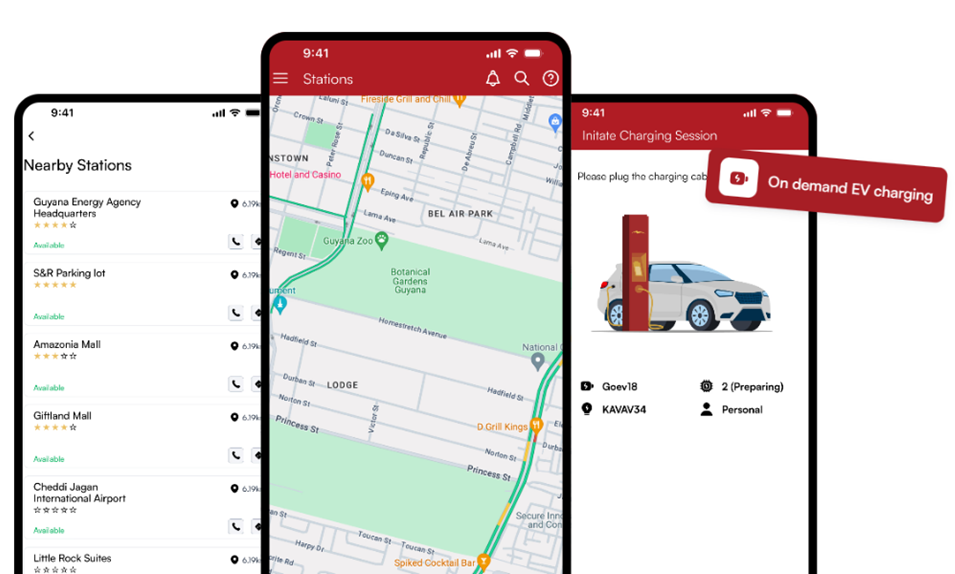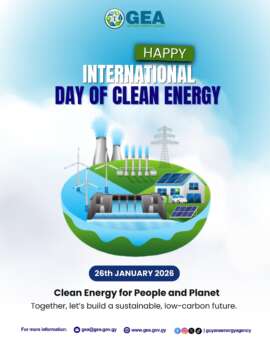Dr. Mahender Sharma, CEO of the Guyana Energy Agency (GEA)
– six (6) publicly accessible EV charging stations are convenient, affordable, and available for use by all EV owners and users, as electric mobility development progresses
Georgetown, October 2, 2025 – The Government of Guyana’s investment in advancing clean energy solutions and supporting the shift to electric mobility has spurred rapid growth in the country’s evolving electric mobility industry.
Dr. Mahender Sharma, Chief Executive Officer of the Guyana Energy Agency (GEA), speaking on the progress of electric mobility in the country, reminded that electric vehicles (EVs) are currently benefitting from a range of national investments in infrastructure development, capacity-building initiatives, and fiscal incentives, all underpinned by the country’s low-carbon agenda.

The Government, through its implementing agency, the Guyana Energy Agency (GEA), has been leading the installation and ongoing expansion of electric vehicle (EV) charging infrastructure across Guyana. The GEA is responsible for managing and monitoring the public EV charging stations in Regions 3, 4 and 6. There are a total of six publicly accessible EV charging stations that have been strategically placed at: Amazonia Mall, Providence, East Bank Demerara; Giftland Mall, East Coast Demerara; S&R Parking Lot, Parika; Cheddi Jagan International Airport (CJIA), Timehri; Little Rock Suites (LRTVS), New Amsterdam; and outside of the GEA’s Head Office, Georgetown. These EV charging stations are convenient, affordable, and available for use by the more than 280 electric vehicles (EVs) currently on the country’s roadways.
This effort has kept pace with the accelerating adoption of EVs, while also supporting the development of EV charging services, facilitated through use of the Flash Charge mobile app to enable widespread access.
Since the commissioning of the first EV charging station in December 2023, and the launch of the Flash Charge app, new users have registered via the mobile app. Users are required to complete the registration process after downloading the app from the Google Play or Apple App Store, or by scanning the QR code at a charging station. The app offers advanced access controls, real-time data monitoring, and smart energy management for EV charging sessions. It also allows users to make payments through the platform by their credit or debit card information before initiating a charge session.
At the EV charging stations, the charging sessions are billed at a rate of G$80 per kilowatt-hour (kWh) with a fixed cost of G$220 applied to each charging session.
Against the backdrop of Guyana’s progress towards electric mobility, the transition is expected to accelerate further, driven by continued investments.
From 2023 to date, a total of 21,641.89 kilowatt-hours (kWh) of electricity has already been dispensed through 3,410 EV charging sessions at the facilities. Of this amount, 6,728.11 kWh was dispensed in 2025 thus far, across 976 charging sessions. The consistent growth in usage across the six (6) publicly accessible electric vehicle charging stations underscores the growing adoption and use of electric vehicles (EVs) and the growing momentum of electric mobility in Guyana.
In the month of September alone, 129 charging sessions were recorded as follows:
| September 2025 EV Charging Sessions | |
| Total Number Of Charging Sessions | 129 |
| Total Number Of Units Consumed (kWh) | 1244.21 |
| Number Of Charging Sessions at Amazonia Mall | 48 |
| Number Of Charging Sessions at Giftland Mall | 19 |
| Number Of Charging Sessions at the GEA | 60 |
| Number Of Charging Sessions at Little Rock Suites | 2 |
| Number Of Charging Sessions at S&R Parking Lot | 0 |
| Number Of Charging Sessions at Cheddi Jagan International Airport | 0 |
To support the scaling up of electric vehicles (EVs), the Government has invested in the procurement of an additional 14 electric vehicle (EV) charging stations. These units are currently being manufactured and will arrive in the country by December 2025.
In parallel with EV infrastructure development, the Government has also implemented several fiscal measures to further accelerate EV adoption and support the broader transition to low-carbon transportation. Electric vehicles (EVs) are exempt from all duties and taxes, regardless of power rating. Additionally, the annual write-down allowance for EVs has been increased to 50 percent, to encourage businesses to invest in environmentally friendly vehicles.
Complementing these fiscal incentives, investments have also been made to build technical capacity in support of the shift to electric mobility through several training initiatives spearheaded by the GEA.
Recently, 27 auto electricians and mechanical technicians completed the fourth Electric Vehicle (EV) Maintenance and Repairs training programme, held at the Mahaicony Technical and Vocational Training Centre (MTVTC). This training was supported by the European Union (EU), as part of the EU’s Global Gateway strategy, which prioritizes investments in renewable energy in Latin America and the Caribbean. The activity in Guyana was facilitated under the Euroclima Programme, the EU’s flagship initiative to promote sustainable development and climate action. The programme is co-funded by the German Federal Ministry for Economic Cooperation and Development (BMZ), with the Deutsche Gesellschaft für internationale Zusammenarbeit (GIZ) GmbH, serving as the implementing agency supporting this action in Guyana.
To date, 77 auto electricians and mechanical technicians have now been trained to repair and maintain electric vehicles (EVs) in Guyana.
Building on these EV infrastructure developments and capacity-building efforts, an additional three solar-powered electric vehicle (EV) charging stations are set to be installed through the Just Energy Transition (JET) Seed Funding Initiative by the United Nations, with funding from the Joint Sustainable Development Goals (SDGs) Fund. The initiative is being implemented with technical support from the United Nations Development Programme (UNDP) and the International Organization for Migration (IOM) in collaboration with the Guyana Energy Agency (GEA) and Ministry of Labour’s Board of Industrial Training (BIT). As part of the JET initiative, a training programme has been launched to certify and upskill local professionals in EV maintenance and solar photovoltaic (PV) systems.
The Government of Guyana remains steadfast in advancing the nation’s low-carbon transportation agenda through the strategic expansion of electric mobility infrastructure, notably EV charging stations, capacity-building initiatives, and fiscal incentives. These coordinated national efforts are important to driving the national energy transition and fostering the widespread adoption of electric vehicles (EVs) as a sustainable, modern, and clean mode of transportation.
Dr. Sharma confirms that the GEA continues to implement these and other Government investments, aligning with the Low Carbon Development Strategy (LCDS) 2030, to promote EV adoption as a cornerstone for decarbonizing the local transportation sector and building a sustainable, resilient low-carbon future.



